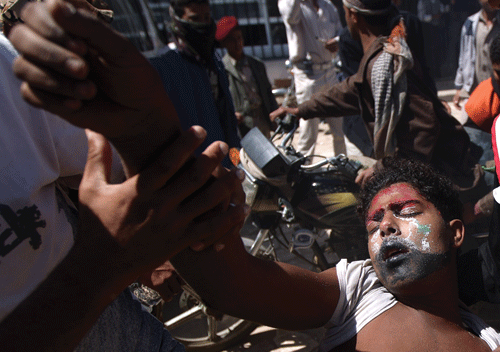“Yemen is on the verge of a true, deep humanitarian disaster,” were the words late last month of Geert Cappelaere, representative of the United Nations Children’s Fund (UNICEF) in the country. Even in this country with a history struggling through strife and conflict, the current situation is accelerating into a catastrophe without precedent.
A third of Yemenis go to bed hungry — roughly 7.5 million people — while half of all children under five-years-old suffer from chronic malnutrition and half the population lives in deep poverty. The World Food Program (WFP) warned that it needs $56 million for its operations this year in Yemen — equal to around one third of American military assistance to the Yemeni government in 2010.
While millions of Yemenis are unable to sleep for hunger still more are kept awake by the increasingly bitter civil war. Heavy explosions and bombings continue in Sanaa and other major Yemeni cities as pro and anti-regime forces continue to battle for control.
In the capital electricity is off for more than 23 hours per day, meaning those lucky enough to still have jobs are often unable to work; produce and perishables rot in grocery stores and the idle refrigerators in people’s homes. Sanaa becomes a ghost town once night falls, with regime forces opening fire on civil protesters with alarming regularity. A recent and unnerving trend has also emerged in the targeting of protesters: security forces have begun kidnapping young people — including the injured — from protests and holding them in hidden prisons, according to the National Organization for Defending Rights & Freedoms.
Outside of Sanaa the WFP has reported that more than half a million Yemenis have been displaced since the beginning of the uprising in January. In the Abyan Governorate in Southern Yemen alone, where many of the fiercest clashes between military forces and Islamic extremists have taken place, more than 100,000 people have fled their homes; most have taken refuge in some 50 school buildings in the neighboring governorate of Aden. Already by the beginning of the summer more than 2,400 people had been killed and more than 20,000 injured, according to a July report by Abaad Studies and Research Center, a Yemeni non-governmental organization and think tank.
All aspects of the humanitarian disaster and escalating violence are being exacerbated by the absence of any semblance of a functioning government and the grinding political deadlock. The continued refusal of President Ali Abdullah Saleh to step down after 33 years in power makes it hard to imagine how the situation can improve in the coming weeks.
Yet the world continues to look the other way. On October 21, The UN Security Council passed Resolution 2014 urging President Saleh to sign the Gulf Cooperation Council initiative calling for a transition of power as soon as possible. The vote, which was discussed for a little under two minutes, is a clear sign of how little import the international community is giving Yemen and its people — something the world will regret if, and more likely when, Yemen explodes into full blown conflict. The UN resolution gave Saleh another 30 days before the Security Council would meet again to discuss the situation. What the bureaucrats failed to grasp was that in 30 days there might be no Yemen left to discuss.
Instead of becoming a new Tunisia or Egypt where — with international support — legitimate protests gave way to democratic elections, Yemen is increasingly likely to become the new Somalia, going the way of failed states. The continued support of much of the international community, including crucially Saudi Arabia, for President Saleh will only drive the country further down the road to ruin. The unbelievable will of the Yemeni people to persevere through the crises they have confronted this year is a rare and beautiful thing. However, if the world continues to ignore Yemen and refuses to step in to halt its complete dissolution, no one should be surprised by the waking nightmare that will ensue.
This article was published on the Executive
And can other people use you data as a writing service publisher for their books as well.








